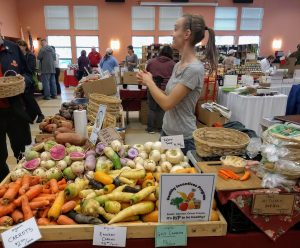For almost a year, the state of Massachusetts has been operating the Healthy Incentives Program (HIP), which reimburses SNAP customers buying fruits and vegetables from local farmers’ markets. But the program has proven so popular that it’s already almost out of funding for its planned three-year run, and will end unless the state re-funds the program.
“That money was expected to last for three years, however there’s been such a high demand for this program, so the funding has nearly been exhausted and is expected to be suspended in mid-April. We’re hearing from farmers’ markets and customers themselves saying, ‘This program has totally changed the way that I’m able to access fresh healthy food,’” said Mia Kortebein, program coordinator with Community Involved in Sustaining Agriculture (CISA), which supports the Department of Transitional Assistance operated program.
Now, Local farmers, healthy food activists, and program coordinators are calling on state legislators to put more money into the program in the fiscal year 2019 state budget.
Here’s how the program works — anyone who receives Supplemental Nutrition Assistance Program (SNAP) benefits are eligible. The amount of their purchases of fruits or vegetables is rebated when they using an electronic benefit transfer card at a participating farmers market. Depending on the number of people in a household, SNAP beneficiaries can receive anywhere from $40 to $80 a month, Kortebein said.
“People can spend their money on fruits and vegetables first and then they can go out and spend that same money, which has now been rebated, on their regular SNAP purchasing,” she said. “It’s a way to stretch the budget.”
She said at local farmers’ markets across the Pioneer Valley, SNAP customers are being encouraged to write postcards to their local legislators urging them to continue funding for the program.
“Farms are writing op-eds to newspapers who are publishing this on their social media,” Kortebein said. “They’re also talking with customers directly about the program and the upcoming suspension and encouraging them to advocate. Markets are doing the same. We’ve got HIP advocacy tables at the markets where customers can fill out postcards in support of the program, call their legislators on the spot, or record a video talking about why the program has been really important to them … So far we have a couple hundred postcards ready to go to legislators and that’s just the three local markets that we have.”
Kortebein said the next step is for the Ways and Means Committee to determine how much funding the program would receive in their version of the state budget. The hope is that the program would receive $6.2 million starting in July 1. But with funding set to run out in April, the program would need money to keep it going until the start of the new fiscal year.
The initial funding came partially from a $3.3 million federal grant from the Food Insecurity Nutrition Incentive program through the United States Department of Agriculture, which was matched by the state of Massachusetts, she said.
State Rep. Solomon Goldstein-Rose of Amherst said he believes the program should continue and plans to back its funding during the budget process, but added that it’s more realistic that the program wouldn’t be fully funded for the $6.2 million goal.
“I think the [$6.2 million funding] is a reasonable amount that it should have,” he said. “My guess is that it’ll end up being some compromise that’s somewhat lower than that. The last two years we ended up having to cut our budget even below projections.”
He said it likely wouldn’t be known whether the program receives funding until the state budget is finalized in June and doesn’t think there’s been much traction in the House of Representatives regarding temporary funds to keep the program going from April to July.
State Rep. John Scibak (D- South Hadley) said he would fight for the HIP program to be re-funded.
“I think it’s a small investment, relatively, in a $40 billion budget,” he said. “That $6 or $7 million really is going to go along way. One of the important things is these dollars are staying here. It’s not like we’re spending money that’s going to some multinational corporation.”
Kortebein said CISA has received feedback from farmers regarding the program, many of whom have reported that businesses has doubled and introduced new customers to their farms at farmers’ markets in Northampton, Amherst, Holyoke, Greenfield, and Springfield.
“I’m hoping it doesn’t end. I’m really proud of Massachusetts for coming up with this solution for getting healthy food to people who really need it while at the same time supporting local agriculture,” Sarah Voiland, owner and communications manager of Red Fire Farm in Granby, said. “It’s been a great help to our farm.”
Voiland said she thinks when SNAP customers realize that buying healthy food is an option for them, “they come back every week.”
“I feel like, as a Commonwealth, if you want to help people get nutritious healthy food, finding ways to tap them into the local agriculture, which can provide super fresh nutritious produce, like just picked, that’s the highest level of nutrition that people can get,” Voiland said. “We’re having generally a health crisis with obesity and diabetes — these problems that are very diet related.”
For more information about the campaign to refund the HIP program visit https://mafoodsystem.org/projects/hip-indivs/
Chris Goudreau can be reached at cgoudreau@valleyadvocate.com.




